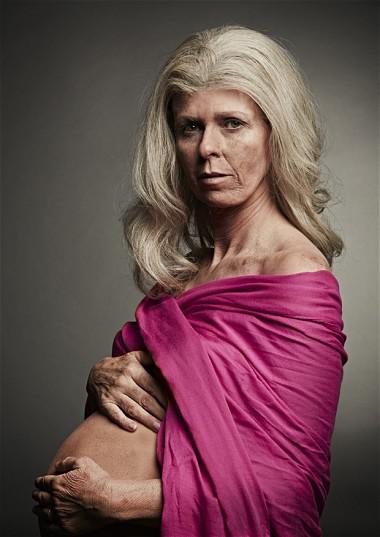Think Progress calls attention to a new ad campaign in the United Kingdom called Get Britain Fertile. The ad in question features a 45-year-old TV host named Kate Garraway, who is put in a gray wig and old-lady makeup and shown cradling a pregnant belly. Garraway says of the campaign, “I want to alert women to start thinking about their fertility at a younger age than my generation did.”
Think Progress’ Aviva Shen is appalled by the campaign, in part because she says women are well aware of their declining fertility as they age. But some studies show women actually don’t know how much their fertility plunges in their 30s. According to a 2011 fertility IQ survey of more than 1,000 women between the ages of 25 and 35 who had never given birth, who used birth control or family planning, and who had visited an OB-GYN in the past year, 7 out of 10 respondents plan to have children. And yet:
Despite most women planning to leave their first pregnancy until their early 30s, three in four women do not have concerns about being able to conceive—the same percentage believe they will have an average, or easier time becoming pregnant compared to most women.
Shen (who once worked for Slate’s “Political Gabfest”) mentions a fertility breakthrough that will “make women undergoing in vitro fertilization three times more likely to have a baby.” But the mention of IVF does somewhat of a disservice to how difficult—both physically and emotionally—it is for some women to go through the procedure. It’s also expensive and not always covered by health care.
I agree with Shen that the Get Britain Fertile campaign is ham-fisted, and she’s right that there are “real fiscal issues young women explicitly say are keeping them from having children earlier,” like student loans, recession-based career delays, and the high cost of child care in both the United States and United Kingdom. These are things that need to be addressed by any government that is concerned about a declining fertility rate and the happiness of its populace.
Still, there has to be a way to have an honest conversation about how fertility declines with age—and about what having difficulty conceiving feels like—without claims that we’re “shaming” women or ad campaigns that are designed to scare women with images of pregnant old hags. If women don’t want to have kids, that’s great! They should not have them or be made to feel bad for not having them. But when 70 percent of women say they do want kids, and more and more are having them later and later, I don’t see anything wrong with arming them with facts.
